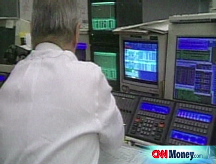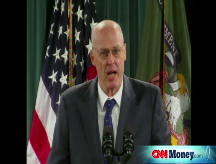Ban the shorts? A BIG mistake!
By temporarily banning short-selling on banks, the SEC is setting a dangerous precedent and is failing to address the real problems plaguing Wall Street.
NEW YORK (CNNMoney.com) -- Randy Newman once famously sang that short people got no reason to live. Apparently, SEC chairman Christopher Cox feels the same way about short sellers.
The Securities and Exchange Commission's plan to temporarily ban short selling in shares of 799 financial services companies is a bold - but highly flawed - move to try and restore confidence in Wall Street and the entire banking system.
I understand why the SEC is taking this step, but I think it sets a dangerous precedent, could create more problems than it solves and doesn't address the fundamental problem facing bank stocks.
First off, this bet on declining stock prices is a healthy part of the financial markets. Short sellers borrow shares they don't own and sell them, hoping to later buy them back at a lower price so they can pocket the difference.
The practice ensures an orderly functioning of the stock market - "longs" bet on the upside, "shorts" bet on the downside, and the markets move along.
Banning the practice could cause disruptions. "This is borderline insanity - if the SEC had set out specifically to make the liquidity problems worse, they couldn't have done a better job," said William Fleckenstein, president of Fleckenstein Capital, a Seattle-based firm that specializes in short selling. "Guys that are short are like guys that are long. We're just looking to make money."
Second, in the past few years, shorts have often identified fraudulent companies such as Enron, Tyco and WorldCom before many others saw the problems. You can argue that shorts were once again early in identifying banks that were in financial danger.
It is true that short selling may have exacerbated the problems plaguing banks. Rapidly plunging stock prices led to a crisis of confidence that fed on itself and sent prices even lower. And as I pointed out in a column last week, short sellers have been increasingly making bearish bets on banks that are not facing big credit-related problems.
But it's not the fault of short sellers that Lehman Brothers (LEH, Fortune 500), AIG (AIG, Fortune 500), Washington Mutual (WM, Fortune 500), Wachovia (WB, Fortune 500), Merrill Lynch (MER, Fortune 500) and Citigroup (C, Fortune 500) - to name a few - have been bleeding red ink for the past few quarters.
The issue at hand is not that short selling is evil. It is that some short sellers engaged in illegal practices, manipulating the market by spreading rumors to push stocks lower.
It is such manipulation, not the practice of short selling itself, that the SEC should crack down on. The SEC's statement about the ban lacked any mention of how the commission planned to fight fraud.
Instead, the SEC seemed to compare short sellers to kindergartners in need of a nap. The statement Friday morning said that the temporary ban amounted to a "time-out."
What the SEC is doing is equivalent to a police department investigating a series of suspicious fires deciding that, rather than catching the crook, they'll temporarily ban the sale of all matches in the hopes that after the ban is over, the arsonist will have decided to stop being a pyromaniac.
"What is the SEC gong to do next? Outlaw all selling?" asks Fleckenstein, who is also the author of the book Greenspan's Bubbles.
The SEC's ban creates a potential new problem. Between now and the end of the ban on Oct. 2, the value of many banks that deserve to be trading lower may become artificially inflated.
John Derrick, director of research at U.S. Global Investors, a money management firm based in San Antonio with about $5.4 billion in assets, said that while the SEC's ban is a "prudent" idea for the short-term given how volatile the markets have been, he worries that there could be some very large unintended consequences.
After all, when the SEC first banned so-called "naked" short selling on a smaller group of financial stocks in July, that temporarily led to a big boost in bank stocks. That obviously didn't last.
"Are we going to have a replay of July where we get a bounce for a few days and then you're fighting the same battles a few months from now?" Derrick wondered.
For all the talk of capitalism now being dead given the government's plan to likely assume much of the banking industry's mortgage-related illiquid assets as well as the takeovers of Fannie Mae, Freddie Mac and AIG, the SEC's action is far more ominous for those who believe in free markets.
There is ample historical precedent for the government stepping in to bailout companies deemed crucial to the nation's economy: Penn Central Railroad, Chrysler and the Resolution Trust Corporation set up to help solve the savings and loan crisis all come to mind.
But what the SEC announced Friday is just a monumentally bad idea. Loyal readers of this column know that I am fairly optimistic about the chances for an economic and market rebound - and they often berate me for it.
However, one thing I am not is a market cheerleader or fan of excessive regulation. And at the end of the day, the SEC's actions are highly hypocritical.
The SEC is attempting to curtail market manipulation. But it is doing so by manipulating the market. ![]()




